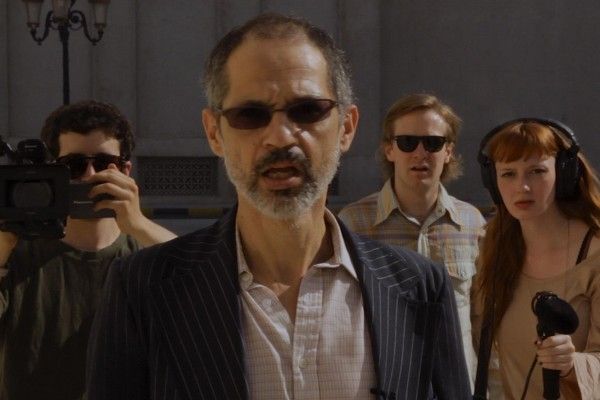Director Caveh Zahedi's documentary The Sheik and I will provoke strong reactions but not about its intended subjects of religion and culture. Imagining himself as a righteous firebrand, Zahedi aims to rile up his audience through his irreverent attitude towards Islamic society. Instead, our anger is not at his irreverence, but at his ego, selfishness, hypocrisy, and lack of talent. Zahedi mercilessly grinds us on through his bloated, poorly-framed tribute to his "subversion" of Islamic society, and then tries to hedge by saying that making everything awful was his intent. But no one should dare stifle his art and freedom of expression, especially those who funded his art and live in a country where freedom of expression is not a constitutional right. The Sheik and I would be a fascinating character study of a talentless hack if the talentless hack hadn't made such an utter chore of a movie.The Middle Eastern Biennial in the United Arab Emirates commissions Zahedi to make a "subversive" film. In one of the indie director's few defenses, the mission statement the MEB provides is incredibly vague, and doesn't specify what "subversive" means, especially in a society that places limits on artistic expression. However, when Zahedi meets with a woman representing the Biennial, he asks her point blank if he can make fun of Sheik Sharjah since that's the kind of subversion he finds appealing. She demurs a bit and then directly tells him that he shouldn't do that. Slowly, Zahedi begins to show that he doesn't really pay attention to answers he doesn't want, and begins planning a half-assed film within a mockumentary, and then uses that processes as the story for the documentary The Sheik and I.For Zahedi, a documentary about making a mockumentary is fascinating because the audience will get to spend so much time with his thinking process. How can we not be riveted by watching Zahedi obtain permits? What is more captivating than seeing Zahedi argue with an upset local who has been duped into joining Zahedi's potentially blasphemous production? Looking at some of achingly dull scenes Zahedi included, I can't help but wonder what footage he deemed too boring to include in his picture. When the movie opens and he's sitting down to begin his narration, the movie spends over a minute watching him try to pick out the right shirt. Before we get the displeasure of knowing Zahedi, this intro seems like a bit of humorous neurotic behavior. Looking back on the opening, it's a warning about how Zahedi wants you to witness him agonize over every minor decision as if he's the most fascinating person who had ever lived.Zahedi's high opinion of himself is completely unearned. It's like watching The Office's Michael Scott but without the charm, comic timing, and desire to please others. Zahedi admits that in his mockumentary, he's intentionally playing into the stereotype of the arrogant American. He doesn't seem to realize that he's not Sacha Baron Cohen, and that putting on some robes and a wearing a Keffiyeh doesn't make him a zany character. Zahedi thinks that roping in total strangers to star in his fake movie is wacky fun. He's going to put them in an intentionally terrible film that doesn't have a plot! It involves Islamic stereotypes like kidnappers and bad guys stopping to pray in the middle of a kidnapping! Look! There's Zahedi's little kid carrying a fake gun and rescuing the hostages! How can something so adorable be blasphemous? If Zahedi believes he has comic timing, a talent for satire, or any idea how to do comedy beyond cutesy animated reenactments, he's sorely mistaken. But Zahedi is like a kid who grew up always being told that he was amazing at everything and now refuses to believe otherwise. Directors should be tenacious in what they want, but Zahedi is gratingly exploitative. He may be playing an arrogant American to the audience of his mockumentary, but the Arabs he meets aren't aware that he's playing a character. Most of them don't understand his celebration reflexive storytelling. However, they do understand that Zahedi's film could get them in hot water with the government, and his Arab stars are continually forced to beg for removal from the picture (Zahedi ignores their request for The Sheik and I).We're forced to further choke on Zahedi's bullshit when he claims that the goal of his mockumentary wasn't to mock Arabs but to celebrate them. "I wanted to show how all of the people I met were cool!" exclaims the empty-headed director. But then he becomes upset when representatives for the Biennial (two of the "cool" people he wanted to celebrate) say that they have problems with the potentially blasphemous aspects of his mockumentary, and that they probably won't show it. Zahedi is enraged that they're going to stop his freedom of expression. He has a point that an organization that supports the arts shouldn't be stifling artistic expression, but his righteous indignation blinds him to two very important facts:1.) He's being blocked by the people who paid for his movie. If someone commissions you to do a painting and then they decide, for whatever reason, not to hang it in their gallery, you don't get to throw a tantrum about not having your work displayed. It is the property of the buyer and Zahedi is remarkably naïve and immature if he thinks the artist has final say in such a situation.2.) You can't use "Freedom of Expression" as a defense if your expression is being denied in a non-U.S. country. Zahedi wants us to believe that his behavior in the mockumentary was just him playing the "arrogant American" stereotype. But if the documentary, The Sheik and I, is meant to be reality, then the "arrogant American" wasn't much of an acting stretch. Zahedi may claim to celebrate cool Arab people, but all of his actions speak to someone who has absolutely no respect for anyone other than himself. During the filming of his mockumentary, every passerby is a plaything who can be shoved into Zahedi's crappy fake film.The Sheik and I is Zahedi's plea to us about how his genius was stifled and how his right to artistic expression was violated. If we weren't busy checking our watches every two minutes, we would be dumbstruck by Zahedi's unrelentingly obnoxious, self-serving, and oblivious personality. He's a champion who's not heroic, a comedian who's not funny, a social critic who's not insightful, and a filmmaker who needs to get over himself.Rating: FFor all of our SXSW 2012 coverage, click here. Also, here are links to all of my SXSW reviews so far:
If Zahedi believes he has comic timing, a talent for satire, or any idea how to do comedy beyond cutesy animated reenactments, he's sorely mistaken. But Zahedi is like a kid who grew up always being told that he was amazing at everything and now refuses to believe otherwise. Directors should be tenacious in what they want, but Zahedi is gratingly exploitative. He may be playing an arrogant American to the audience of his mockumentary, but the Arabs he meets aren't aware that he's playing a character. Most of them don't understand his celebration reflexive storytelling. However, they do understand that Zahedi's film could get them in hot water with the government, and his Arab stars are continually forced to beg for removal from the picture (Zahedi ignores their request for The Sheik and I).We're forced to further choke on Zahedi's bullshit when he claims that the goal of his mockumentary wasn't to mock Arabs but to celebrate them. "I wanted to show how all of the people I met were cool!" exclaims the empty-headed director. But then he becomes upset when representatives for the Biennial (two of the "cool" people he wanted to celebrate) say that they have problems with the potentially blasphemous aspects of his mockumentary, and that they probably won't show it. Zahedi is enraged that they're going to stop his freedom of expression. He has a point that an organization that supports the arts shouldn't be stifling artistic expression, but his righteous indignation blinds him to two very important facts:1.) He's being blocked by the people who paid for his movie. If someone commissions you to do a painting and then they decide, for whatever reason, not to hang it in their gallery, you don't get to throw a tantrum about not having your work displayed. It is the property of the buyer and Zahedi is remarkably naïve and immature if he thinks the artist has final say in such a situation.2.) You can't use "Freedom of Expression" as a defense if your expression is being denied in a non-U.S. country. Zahedi wants us to believe that his behavior in the mockumentary was just him playing the "arrogant American" stereotype. But if the documentary, The Sheik and I, is meant to be reality, then the "arrogant American" wasn't much of an acting stretch. Zahedi may claim to celebrate cool Arab people, but all of his actions speak to someone who has absolutely no respect for anyone other than himself. During the filming of his mockumentary, every passerby is a plaything who can be shoved into Zahedi's crappy fake film.The Sheik and I is Zahedi's plea to us about how his genius was stifled and how his right to artistic expression was violated. If we weren't busy checking our watches every two minutes, we would be dumbstruck by Zahedi's unrelentingly obnoxious, self-serving, and oblivious personality. He's a champion who's not heroic, a comedian who's not funny, a social critic who's not insightful, and a filmmaker who needs to get over himself.Rating: FFor all of our SXSW 2012 coverage, click here. Also, here are links to all of my SXSW reviews so far:

